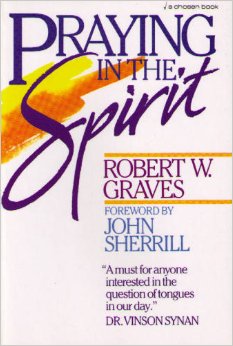Praying in the Spirit: Now That You’ve Spoken in Tongues
The eighth chapter of the Praying in the Spirit Series. Author Robert Graves looks at the on-going ministry of the Holy Spirit in the Spirit-filled believer’s life.

Robert W. Graves wrote Praying in the Spirit (Chosen Books) in 1987, when it received great reviews from a number of Pentecostal/charismatic scholars and leaders including John Sherrill, Dr. Vinson Synan, Dr. Gordon Fee, Dr. William Menzies, Dr. Howard Ervin, Dr. Walter Martin, and Dr. Stanley Horton. It is the great privilege of the Pneuma Review to republish it here.
I know a young man named Bob, a Pentecostal, who has not spoken in tongues since his initial encounter with the Holy Spirit. Unfortunately, he is just one of many who have had an incomplete charismatic experience. Perhaps they were taught that the experience was once-and-for-all and never to be repeated. Or maybe, in their minds, the encounter was so exalted that they believed a common occurrence of it would diminish its value. Others may have been startled, even frightened, by this awesome contact with God—further familiarity was not considered reverent. Still others, having experienced tongues only after much tarrying, agonizing, and begging, may have concluded that once was difficult enough. For whatever reasons, many charismatic Christians have lost out on the richness of this experience because they were not instructed that they could and should continue to use their prayer language.
Using the Prayer Language
The apostle Paul implied that he prayed in tongues as much as he prayed with his understanding: “For if I pray in a tongue, my spirit prays, but my mind is unfruitful. So what shall I do? I will pray with my spirit, but I will also pray with my mind; I will sing with my spirit, but I will also sing with my mind… I thank God that I speak in tongues more than all of you” (1 Cor. 14: 14 – 15, 18). Since Paul was reluctant to speak in tongues to edify the church, he must have spent most of his time speaking in tongues in personal prayer and praise of God. These verses show that Paul did not stop speaking in tongues after his initial experience and that he used glossolalic utterances in his personal prayer life beyond the “church walls.”
In this passage of Scripture, Paul uses three words in his description of glossolalic language that provides us with indicators of his own use of tongues. In verse 14 he calls it “praying” (proseuchomai); in verse 16 he calls it “praising” (eulogeo);” also in this verse he calls it “thanksgiving” (eucharisteo). If we are to use the prayer language Biblically, certainly we should let the words of Paul, Spirit-inspired apostle and charismatic par excellence, inform our doctrine and practice. According to Paul, we may use our heart-language to pray to God—that is, petition Him; we may use it to praise Him for who He is; or we may use it to thank Him for what He has done.
Category: Spirit, Winter 2001


